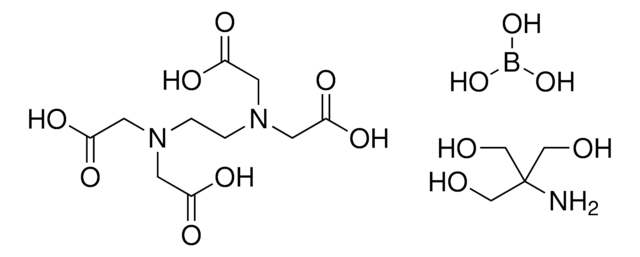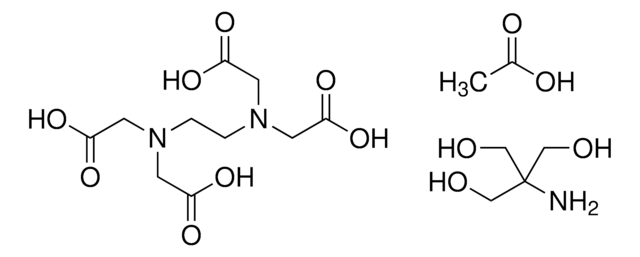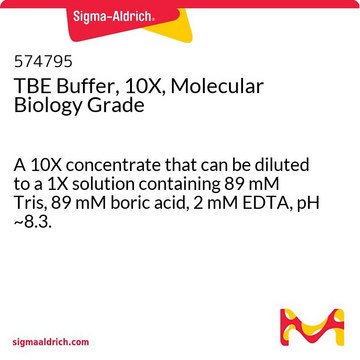T6400
Tris-Borate-EDTA buffer
5× Concentrate
Synonym(s):
TBE buffer
About This Item
Recommended Products
Quality Level
sterility
0.2 μm filtered
form
solution
impurities
DNase and RNase, none detected
pH
8.2-8.4 (25 °C)
SMILES string
OB(O)O.NC(CO)(CO)CO.OC(=O)CN(CCN(CC(O)=O)CC(O)=O)CC(O)=O
InChI
1S/C10H16N2O8.C4H11NO3.BH3O3/c13-7(14)3-11(4-8(15)16)1-2-12(5-9(17)18)6-10(19)20;5-4(1-6,2-7)3-8;2-1(3)4/h1-6H2,(H,13,14)(H,15,16)(H,17,18)(H,19,20);6-8H,1-3,5H2;2-4H
InChI key
OSBLTNPMIGYQGY-UHFFFAOYSA-N
Looking for similar products? Visit Product Comparison Guide
Application
Dilution of the TBE stock concentrates to a 1× TBE running buffer results in a buffer containing 89 mM Tris-borate and 2 mM EDTA, pH 8.3. The 5× or 10× stocks may also be added to an acrylamide/bis-acrylamide stock solution for making the PAGE gel. Applied voltages of less than 5 V/cm (distance between the electrodes of the unit) are recommended for maximum resolution.
Packaging
Other Notes
Preparation Note
Certificates of Analysis (COA)
Search for Certificates of Analysis (COA) by entering the products Lot/Batch Number. Lot and Batch Numbers can be found on a product’s label following the words ‘Lot’ or ‘Batch’.
Already Own This Product?
Find documentation for the products that you have recently purchased in the Document Library.
Protocols
TAE and TBE are both used as running buffers for nucleic acid electrophoresis but have some important differences. Review our recipes and video to give your application the best chance of success.
The GenElute Blood Genomic DNA Kit Protocol provides a simple and convenient way to isolate pure genomic DNA from fresh or aged whole blood.
GenElute Bacterial Genomic DNA Kit protocol describes a simple and convenient way for the isolation of pure genomic DNA from bacteria.
Our team of scientists has experience in all areas of research including Life Science, Material Science, Chemical Synthesis, Chromatography, Analytical and many others.
Contact Technical Service




